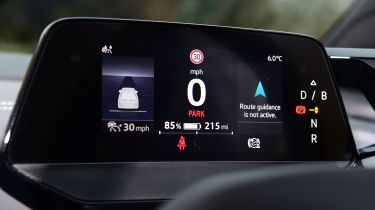Volkswagen ID.4 review: running costs & insurance
Electric power means fuel costs are low, and company-car tax rules mean the Volkswagen ID.4 is a very tempting business choice
| Insurance group | Warranty | Service interval | Annual company-car tax |
|---|---|---|---|
| 18-28 | 3yrs / 60,000 miles | 2yrs / unlimited miles | From £140 / £280 |
The cheapest of the regular trim levels, the entry-level Life Pure with a 58kWh battery, costs just under £38,000. The cheapest 77kWh battery model, the Life Pro, starts from under £44,000. The range-topping GTX trim levels cost a lot more, at over £50,000.
All this means the ID.4 is somewhere in the middle of the electric family SUV market right now – it’s not the cheapest around, but it’s also not at the more expensive end of the scale, either. Company-car tax rules mean that the ID.4 has a Benefit-in-Kind rate of 2% until at least April 2024. It’s also exempt from the London Congestion Charge until 2025.
Volkswagen ID.4 insurance group
Depending on trim level, the ID.4 has an insurance group rating of 18 to 28 in most trim levels which is on par with similarly powerful electric cars such as the Nissan Leaf and Volkswagen ID.3. You can buy fixed-price insurance from Volkswagen, which won’t go up or down in price over the first three years, though you’re not tied into a contract so you can always change your cover if it becomes cheaper elsewhere later on.
Warranty
Volkswagen offers a three-year/60,000-mile warranty on all its cars, plus the batteries are covered for eight years or 100,000 miles. These are okay, although a Kia Niro EV comes with a seven-year warranty from the factory and a Hyundai Kona Electric gets five years of cover as standard.
Servicing
You might be used to sending your combustion-engined car for a service every year, but the ID.4 only needs to be looked at every two years – as electric cars have far fewer moving parts. This is another area where you’ll save money compared to running a petrol or diesel car.
Road tax
Company-car tax is notably low on electric cars, but you also don’t have to pay vehicle excise duty (VED), otherwise known as road tax. Note that you do have to ‘tax’ the car each year, but there’s no actual charge to do this and it can be done online very easily.
Depreciation
The Volkswagen ID.4 is pretty expensive for a mainstream family SUV, starting from around £40,000. According to the latest industry data, it’s expected to retain anything between 46-50% of its value over three years and 36,000 miles of ownership. That’s slightly below average for the class – a Skoda Enyaq is forecast to hold onto roughly 52-56% of its initial asking price – and owners should expect to lose roughly £20,000 if buying new.




